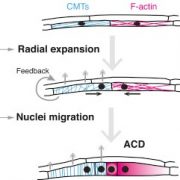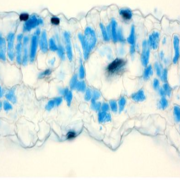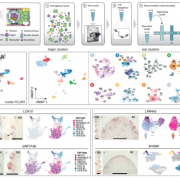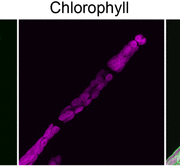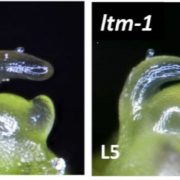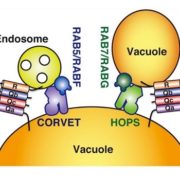Chloroplast biogenesis controlled by DELLA-TOC159 interaction in early plant development (Curr. Biol.)
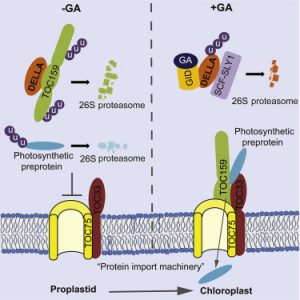 Plant photosynthesis occurs in the chloroplast, the green organelles that are the most famous members of the plastid family. Chloroplast biogenesis starts with illumination at germination, when the colorles, non-photosynthetic proplastid acquires photosynthetic activity as it greens. Gaining photosynthetic function depends on the import of thousands of different preproteins into the developing organelle through the chloroplast protein import machinery. This machinery comprises TOC75, the protein-conducting channel, and the import receptors TOC33 and TOC159. It has been previously demonstrated that gibberellic acid (GA)-dependent downregulation of DELLA proteins is essential for chlorophyll and carotenoid biosynthesis. In this work Shanmugabalaji et al. demonstrate that the expression of the DELLA protein RGL2 is inversely correlated with expression of TOC159 during seed germination. They show that RGL2 and TOC159 physically interact in yeast an in planta and that the inhibition of the ubiquitin/proteasome system increases TOC159 under low-GA conditions. Finally, they conclude that direct interaction with DELLA promotes the degradation of the TOC159 import receptor; upon destruction of DELLA, TOC159 is immediately available for assembly into the TOC complex, which allows full import of photosynthesis-associated proteins into the chloroplast. (Summary by Aime Jaskolowski) Curr. Biol. 10.1016/j.cub.2018.06.006
Plant photosynthesis occurs in the chloroplast, the green organelles that are the most famous members of the plastid family. Chloroplast biogenesis starts with illumination at germination, when the colorles, non-photosynthetic proplastid acquires photosynthetic activity as it greens. Gaining photosynthetic function depends on the import of thousands of different preproteins into the developing organelle through the chloroplast protein import machinery. This machinery comprises TOC75, the protein-conducting channel, and the import receptors TOC33 and TOC159. It has been previously demonstrated that gibberellic acid (GA)-dependent downregulation of DELLA proteins is essential for chlorophyll and carotenoid biosynthesis. In this work Shanmugabalaji et al. demonstrate that the expression of the DELLA protein RGL2 is inversely correlated with expression of TOC159 during seed germination. They show that RGL2 and TOC159 physically interact in yeast an in planta and that the inhibition of the ubiquitin/proteasome system increases TOC159 under low-GA conditions. Finally, they conclude that direct interaction with DELLA promotes the degradation of the TOC159 import receptor; upon destruction of DELLA, TOC159 is immediately available for assembly into the TOC complex, which allows full import of photosynthesis-associated proteins into the chloroplast. (Summary by Aime Jaskolowski) Curr. Biol. 10.1016/j.cub.2018.06.006


